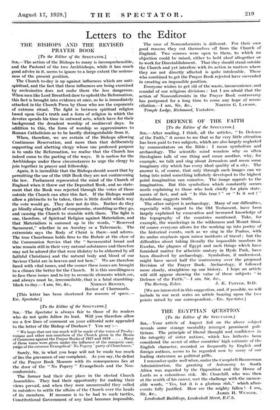[To the Editor of the SPECTATOR.]
SIR,—The Spectator is always fair to those of its readers who do not quite follow its lead. Will you therefore allow me a few lines of comment on your editorial note appended to the letter of the Bishop of Durham ? You say :-
" We hope that not too much will be made of the votes of Presby- terians and other non-members of the Church given in the House of Commons against the Prayer Books of 1927 and 1928 . . . . Many of these votes were given under the influence of the energetic cam- paign of the extreme Evangelical No Popery' party of Churchmen."
Surely, Sir, in what you hope will not be made too much of lies the gravamen of our complaint. As you say, the- efeat
of the Prayer Book Measure with its consequences lies at the door of the " No Popery " Evangelicals and the Non- conformists.
The former had their due place in the elected Church Assemblies. They had their opportunity for making their views prevail, and when they were unsuccessful they called in outsiders to settle the affairs of the Church over the heads of its members. If recourse is to be had to such tactics,
Constitutional Government of any kind becomes impossible. The case of Nonconformists is different. For their own good reasons they cut themselves off from the Church of England. Two courses were open to them, to which no objection could be raised, either to hold aloof altogether or to work for Disestablishment. That they should stand outside the Church and yet interfere with its action in matters where they are not directly affected is quite intolerable. Those who combined to get the Prayer Book rejected have succeeded in creating an impossible position.
Everyone wishis to get rid of the waste, inconvenience, and scandal of our religious divisions : but I am afraid that the action of Nonconformists in the Prayer Book controversy has postponed for a long time to come any hope of recon-
































 Previous page
Previous page